
Church record books often contain a trove of invaluable information including meeting minutes, membership data, birth, baptism, and death records. The consistency of recordkeeping can vary over time, but the information collected is a snapshot into congregational life. During the colonial era that snapshot can be expanded to include a glimpse into the lives of a larger community, as churches tended to be the de facto recordkeepers at this time.
Frequently, these records are used by church historians, genealogists, and those researching subjects of interest across congregations, yet there are also other uses for this material. One of the more illuminating aspects of these record books is that some of the death records include cause of death, a less standard practice, yet one yielding information for public health researchers. There are also mentions of Black and Indigenous people, often identified in the sparsest terms, but their inclusion gives a point from which to further investigate.
Fortunately, the record books collected here were digitized as part of a Harvard-wide project to digitize North American colonial archives across repositories. Harvard Divinity School Library has digitized 35 of our collections either in full or in part, including nearly the 40 church record books available to explore here.
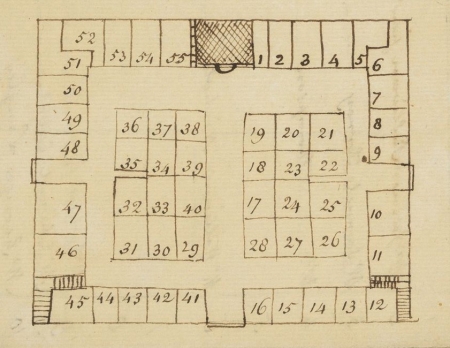
Arlington Street Church (Boston, Mass)
This community was founded in 1729 by Scots-Irish Presbyterians, who were immigrants from the northern part of Ireland. Some of the church's early ministers were John Moorhead, Robert Annan, Jeremy Belknap, John Snelling Popkin, William Ellery Channing, and Ezra Stiles Gannett.
This collection consists of correspondence; official and general church records, including record books of marriages, baptisms, and church membership; material on church committees and organizations; ministers and personnel records; and financial records.
Arlington Street Church Records, 1730-1979
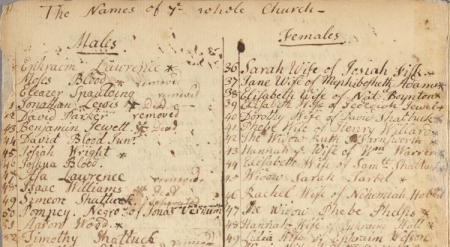
First Parish Church (Pepperell, Mass)
The Community Church of Pepperell is located in the old center of Pepperell, Massachusetts. Originally, the Congregationalists and the Unitarians in Pepperell worshipped together. In 1832, the Congregationalists split from the predominantly Unitarian church and joined again in 1917, as the Federated Church of Unitarians and Congregationalists. On September 16, 1919, the church was incorporated as the nondenominational Community Church Society.
This collection contains the church covenant, the names of members of the church, marriages, dismissals of people to other churches, votes of the church on various issues, baptismal and death records.
First Parish Church Records, 1746-1839
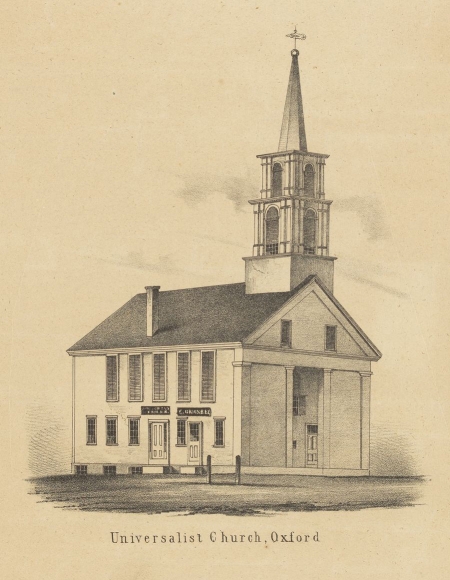
Universalist Society of Oxford (Oxford, Mass)
The Universalist Society of Oxford, Massachusetts was founded in 1785 and a church was built in 1792. It stands as the oldest Universalist church in America. In 1818 the use of the church was split with the Congregational Society for some time. The Society drew members from the towns of Ward, Sutton, Woodstock, Charlton, Sturbridge, and Dudley. In 1917 the Society property was transferred to the Massachusetts Universalist Convention.
Records include correspondence, membership and pew records, orders of service, clippings, and records related to the Massachusetts Universalist Convention's management of the church property.
Universalist Society of Oxford Records, 1785-1955
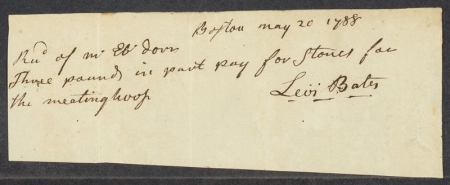
Hollis Street Church (Boston, Mass)
The Eighth Congregational Church in Boston was gathered on November 14, 1732, and soon became known as the Hollis Street Church. The church became Unitarian during Dr. Samuel West's ministry (1789-1808). In October 1887, the church merged with the South Congregational Society.
This collection consists of vouchers, receipts, and pew tax records; deeds of pews and pew bonds; insurance policies; correspondence and notes on the Singing Committee; marriage records, and records of the Hollis Street Sunday School.
Hollis Street Church Records, 1787-1879
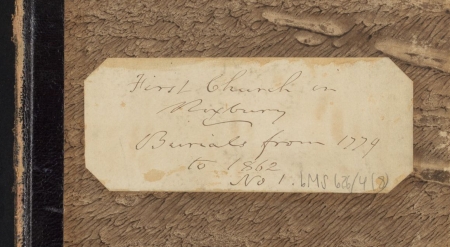
First Church in Roxbury (Boston, Mass)
The area now known as Roxbury was beginning to be populated by English settlers in 1630. In 1631 the church was gathered and the first meetinghouse was built in 1632 establishing the First Church in Roxbury.
This collection contains record books, administrative committee minutes, membership records, baptismal, marriages, and burials registers, and correspondence documenting the activities and ministries of the congregation.
First Church in Roxbury Records, 1630-1956
First Parish Church (Cambridge, Mass)
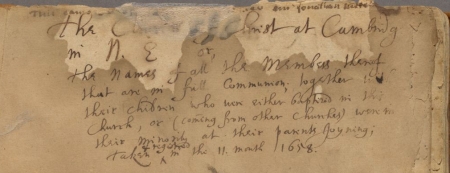
The first Meeting House was built in 1632 and Thomas Hooker became the first minister in 1633. A new church, the First Church in Cambridge, was gathered on February 1, 1636, under the Rev. Thomas Shepard, a significant leader of the great Puritan migration to New England in the 1630s. By 1829 most of the Parish had become Unitarian and the more conservative members departed and founded the Shepard Congregational Society.
In 1899, it was agreed that the church associated with that society should be called the First Church in Cambridge (Congregational), now part of the United Church of Christ, and this church, the First Church in Cambridge (Unitarian).
Records of the First Parish in Cambridge, Massachusetts include financial records, membership records, funeral, wedding, and christening records, annual reports, and committee records.
First Parish Church Records, 1658-1993
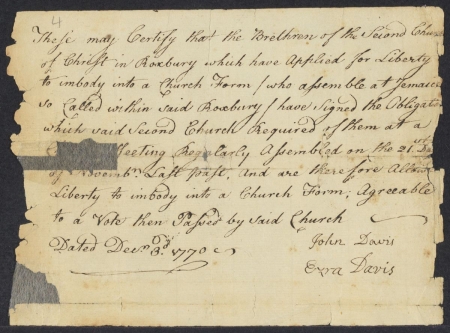
First Congregational Society (Boston, Mass)
This religious society was organized in the colonial town of Roxbury to meet the needs of the growing settlement on the “Pond Plain.” This church was the first and only Congregational church in Jamaica Plain until 1841.
This is a small collection of early church administrative records that include letters from other churches announcing the appointment of their ministers; letters concerning pulpit exchanges; several letters of dismissal for families to attend other churches, and requests for contributions for families who were displaced by a town fire.
Accessing These Materials
Harvard Divinity School Library special collections are available to students, faculty, visiting scholars, and other researchers with interest. Use HOLLIS Special Request to request reproductions or view materials in our secure reading room.